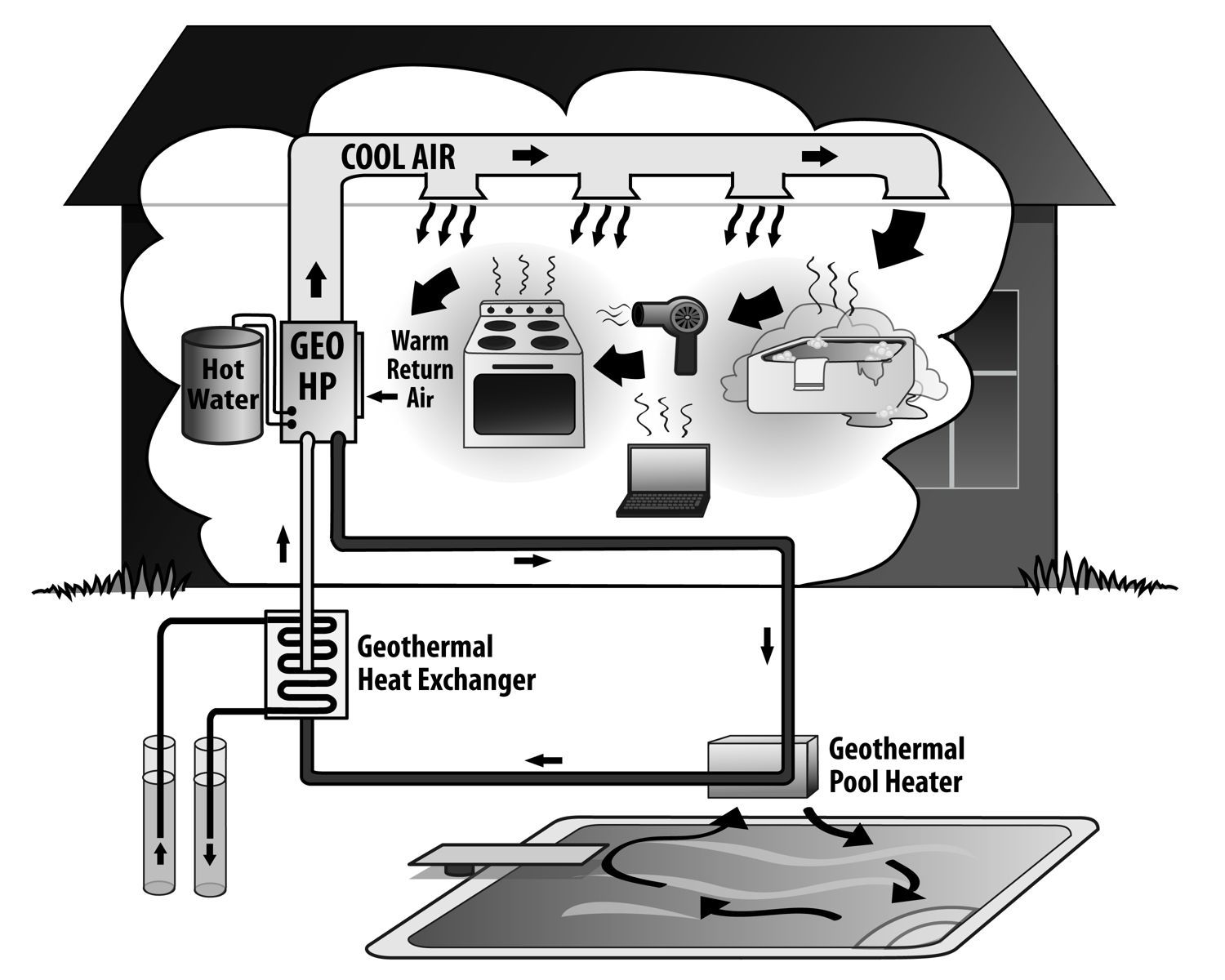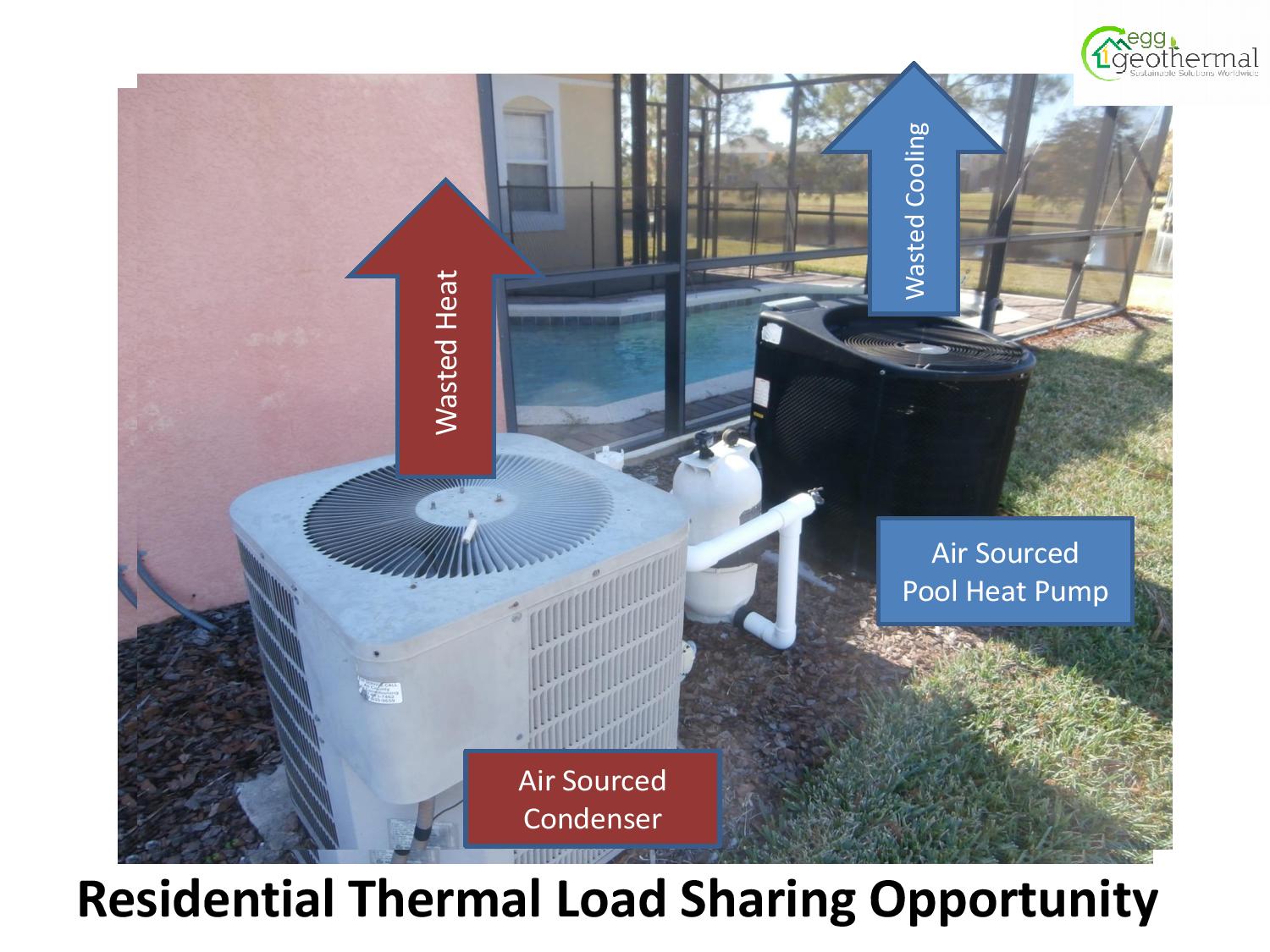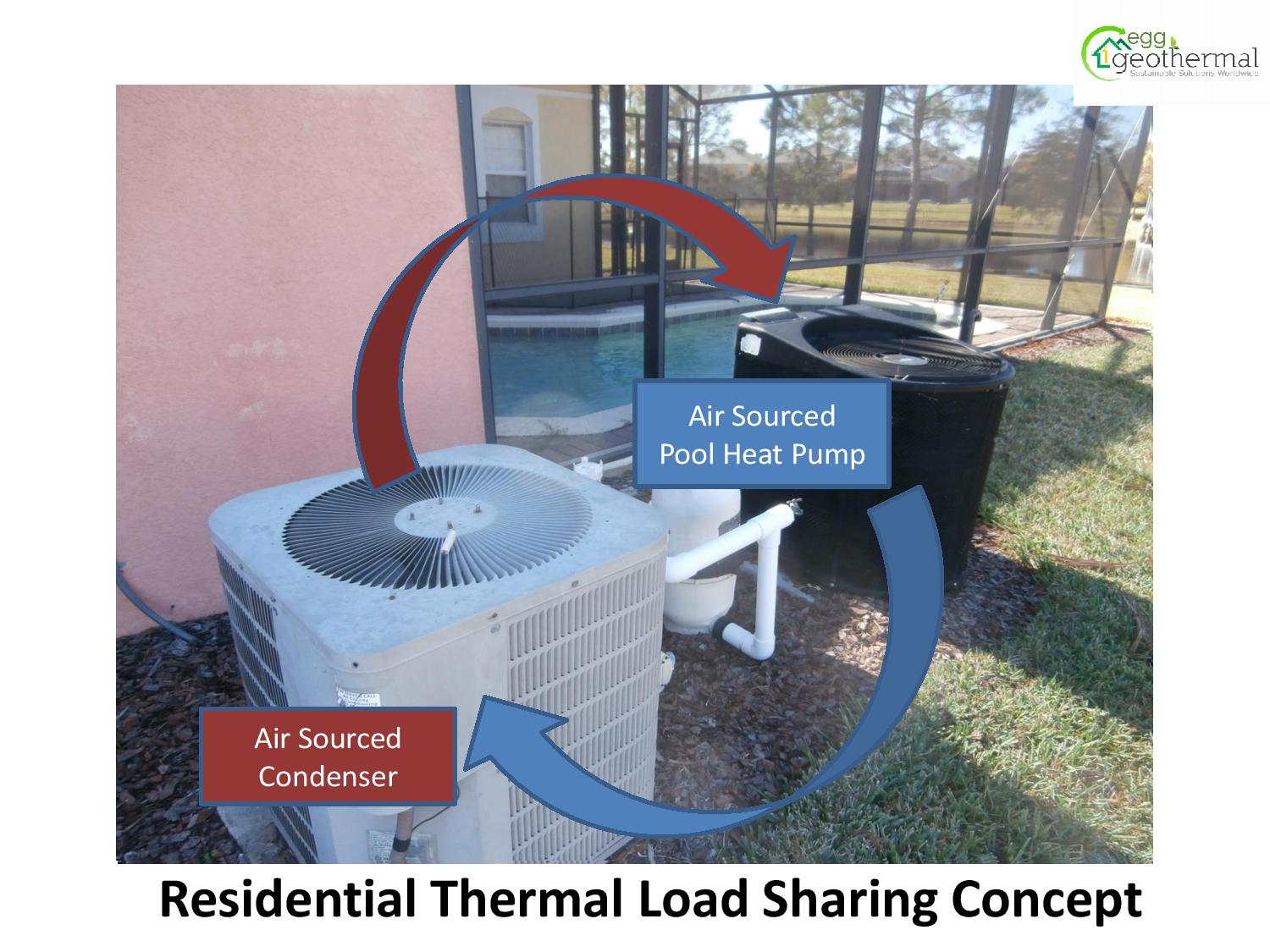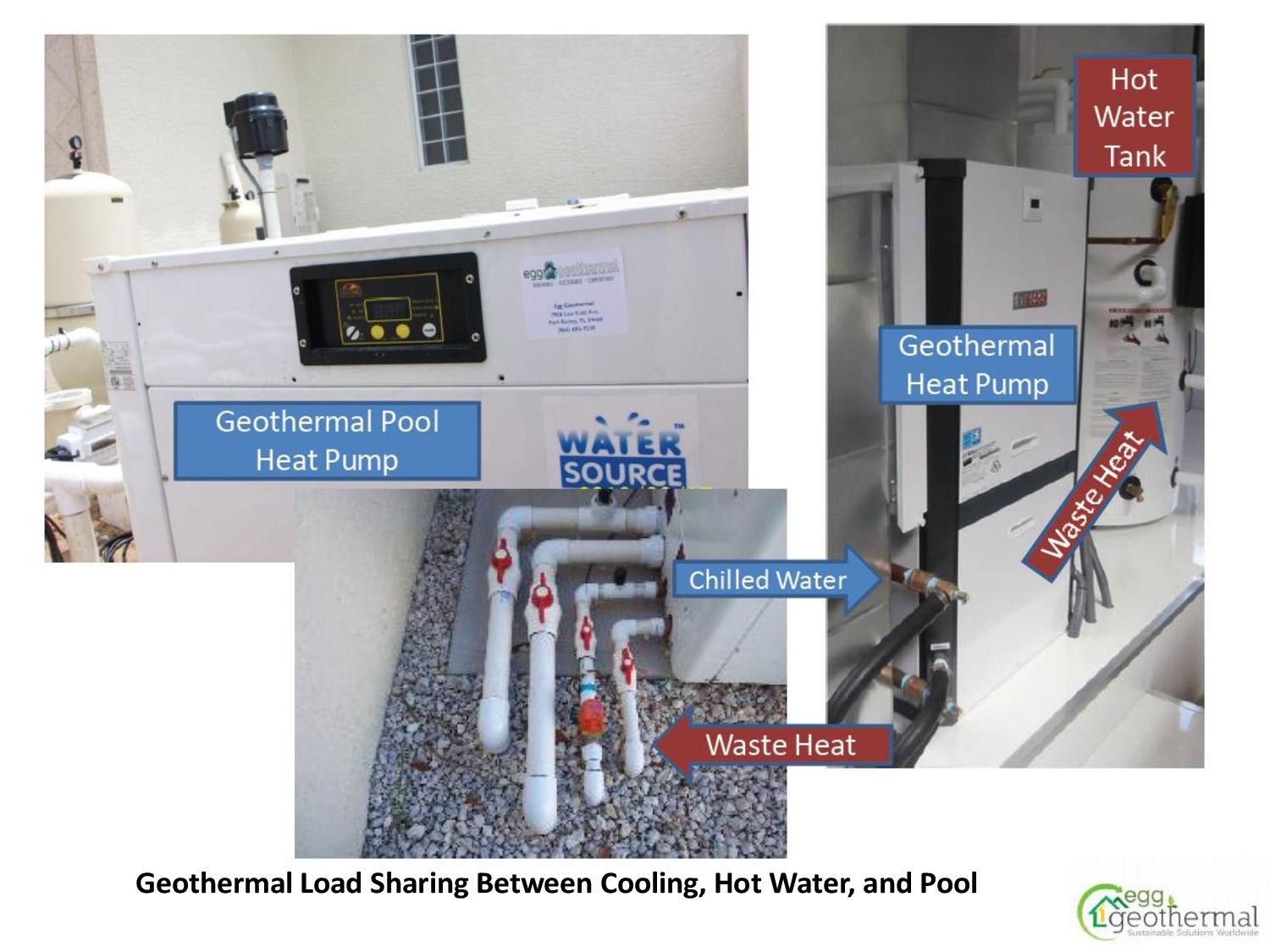Spring is here, and the cooling season is quickly approaching. Pools that have been out of commission after our very cold winter are likely to stay that way unless we turn the heat on. That can get expensive.

Stop for a moment and think of how many blow dryers, computers, cooking appliances, lights and people there are in your home that add to the cooling load. These are all a potential source of energy that can provide domestic hot water and be used to heat spas and pools. With standard air source heat pumps or air conditioners, the heat generated inside your home typically goes out the return air ductwork and ultimately is exhausted through outside air exchange.
Like geothermal sourced cooling and heating systems, geothermal pool heat pumps bring your swimming pool and potable water heating in harmony with nature, while providing high energy efficiency. They do that by working together with the stable earth temperatures to provide heating for your pool throughout your desired swimming season.
With just a little twist to a home’s geothermal heating and cooling system, the waste heat from appliances and devices can be channeled into usable heat for domestic hot water needs, swimming pools, and spas.
There are a few different ways that a pool is normally heated; Fossil fuel, electric resistance, solar, or heat pump (either “air sourced” or “geothermal sourced”).
Solar-thermal is the most energy efficient and renewable source for potable water and pool heating, but solar is dependent upon the cooperation of the weather. Cloudy and cool days can mean a cold pool necessitating the need for backup heating sources during those times.
Fossil fuel heating of potable water, pools and spas is an old favorite. First cost is relatively low, but that comes at a higher price environmentally and monetarily as you move forward. In addition to high costs for propane and other fuels, there are safety issues when fossil fuels are used as in this unfortunate story of carbon monoxide poisoning to guests at a hotel from a pool heater, March 21, in the LA Times.
Electric resistance heating uses raw electricity to warm heating elements over which the water passes, providing a clean and safe water heating alternative, but it can be extremely expensive. Using the Coefficient of Performance (COP) rating system (used internationally) for heating equipment, electric heating has a COP of 1.0, meaning that 1 unit of heat is provided for each unit of electricity, a one-to-one ratio, or 100% efficient in the COP rating system.
Air source heat pumps designed for pool and potable water heating are environmentally friendly and use outside air, pumping heat out of the ambient air into your pool or hot water tank. However, they too rely somewhat on cooperative weather conditions, that is; air temperatures being warm enough to facilitate extraction of heat to transfer to potable water and/or pool heating needs. Air source heat pump efficiencies are in the 3.0 COP ranges (300% efficient).


For swimming pool and spa heating, the best scenario is attained with a geothermal sourced water to water heat pumps, pulling heat from a dependable, steady and renewable energy source; the earth. Geothermalheat pumps can be about 5.0 COP (500% efficient).
Outside, temperatures fluctuate with the changing seasons, but underground temperatures don't change nearly as dramatically, thanks to the mass of the earth. Just 4 to 6 feet below the ground, the temperature remains relatively constant year round (about 45F to 75F in the US). A geothermal sourced water to water heat pump, which can work in tandem with your geothermal HVAC system, typically consists of water sourced heat pump and a buried system of pipes called an earth loop, and/or a pump to reinjection (Class V thermal exchange process illustrated here) well. This geothermal source can be shared between the building’s HVAC and water heating systems.
Think of it like this: While providing power to run your home’s cooling system, you are also paying for the energy to run computers, lights, toasters, and home entertainment items like your big flat-screen TV. Your home’s cooling system must use power to remove the heat created by all of these internal gains on top of the occupant loads (one occupant presents a load of 1200 BTU’s each hour, or 10% of 1 ton of air). You pay for energy twice to remove this waste heat through the process of cooling your building. Why not channel that heat somewhere else where it’s needed? There is a way, and it’s easy with a geothermal sourced building:
Among the benefits that you can get from a geothermal HVAC system is the ability to channel and use this waste heat energy. That’s because unlike the widely used air sourced cooling equipment (those that have an outside condenser that discharge waste heat), geothermal systems discharge the heat through a discharge water line. Most manufacturers of geothermal heat pumps even have a factory installed hot water generator available. This option gives you two extra connections labeled DHW (Domestic Hot Water) “In” and “Out” that may be connected to most any hot water tank, and the geothermal heat pump can turn waste heat into usable hot water.

There are thousands of geothermal heated pools around in the US. There is a good chance that the local YMCA, hotel, health club or community pool near you already has geothermal sourced pool heating, because they maintain heated pools year round. They know geothermal is dependable and ultra-efficient. Surprisingly, many of these still have air sourced cooling systems that could be converted to geothermal (and likely will be) during the normal course of HVAC equipment attrition and upgrade.
Stop paying two and three times to move energy, and share the loads in your home; enjoy true thermal load sharing with a geothermal HVAC system.
You may be qualified for a new solar energy rebate program.
ReplyDeleteDiscover if you are eligble now!
angka 5 dalam togel
ReplyDeleteWA : +62812-2222-995
The information mention is very accurate and very nicely pottered. Swimming pool heaters helps you to relax and release tensions. We can relate to this as we are into the same profession form past more than 12 years in Australia. To get the best heating and cooling pool visit us- https://evoheat.com.au/
ReplyDelete